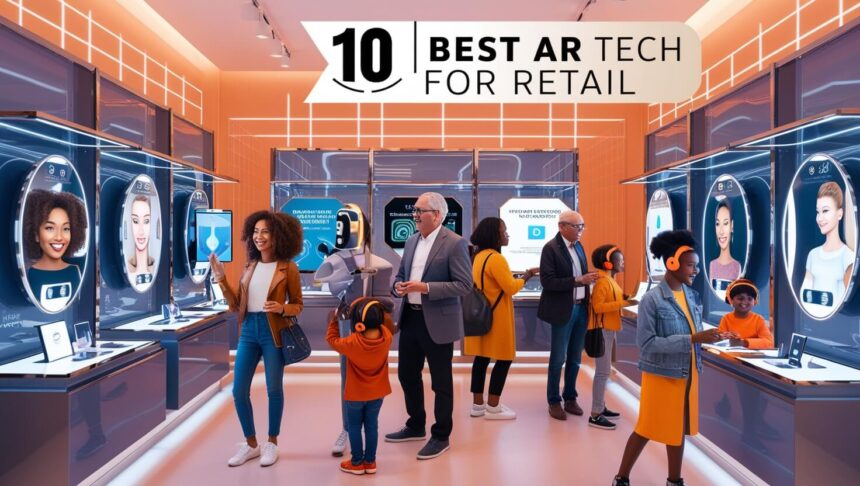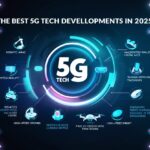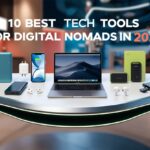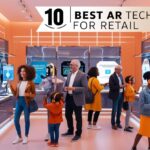In this article I will discuss the Best Augmented Reality (AR) Tech for Retail.
AR is changing the retail world by increasing the level of engagement amongst customers, lowering the rate of returns, and allowing virtual fitting rooms while shopping digitally.
I will focus on different platforms which aid retailers in creating automated and interactive shopping experiences for their customers.
Key Point & Best Augmented Reality (AR) Tech for Retail List
| Platform/Tool | Key Point |
|---|---|
| Shopify AR | Enables merchants to offer 3D product previews directly in Shopify stores. |
| Zakeke | Provides customizable 3D and AR product configurators for eCommerce. |
| Google ARCore | Offers advanced motion tracking and environment understanding for Android. |
| Apple ARKit | Delivers high-performance AR experiences using iOS devices and LiDAR support. |
| Vuforia (by PTC) | Industry-grade AR platform for object recognition and industrial applications. |
| MagicMirror | Open-source platform for building customizable smart mirrors with AR widgets. |
| Banuba Face AR | Specializes in face tracking and beautification filters for apps. |
| Wanna SDK | Provides virtual try-on solutions for fashion and footwear. |
| Snap AR (Lens Studio) | Allows users to create interactive face and world lenses for Snapchat. |
| 8thWall (by Niantic) | WebAR platform that works across mobile devices without needing an app. |
1.Shopify AR
Shopify AR sets itself apart as the most efficient augmented reality (AR) technology for retail as it allows 3D visualization of products to be placed directly into online stores, giving customers a chance to “try before they buy.”
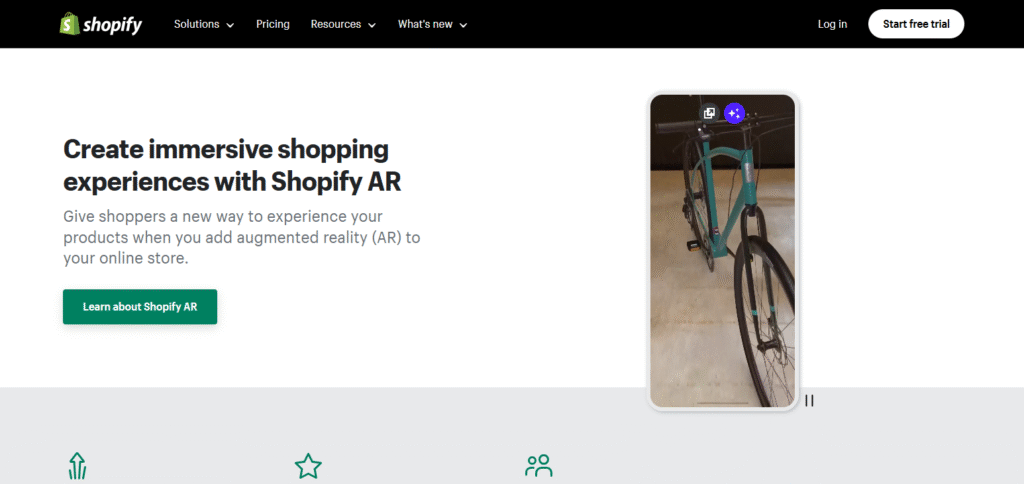
The self-service capabilities of the system which offer substantial easing to non-technical merchants are quite impressive.
Buyers trust the products to a greater extent, which decreases returns and increases conversions, all in the comfort of an eCommerce site. This is remarkable for undersophisticated retailers that are trying to incorporate hyper advanced technologies.
| Category | Details |
|---|---|
| Platform | Shopify |
| Technology Type | Augmented Reality (AR) for eCommerce |
| KYC Consideration | No KYC required for merchants or customers |
| Primary Use Case | Enhancing product visualization in online stores |
| Key Features | 3D model integration, interactive product previews |
| Supported Devices | Mobile, desktop, AR-enabled browsers |
| Retail Benefits | Reduces returns, improves customer engagement |
| Integration | Directly integrates with Shopify stores |
| Notable Brands Using It | Allbirds, Pure Cycles, Arthaus, Instant Pot |
| Market Impact | Helps retailers boost conversions and sales |
2.Zakeke
Zakeke stands out as one of the leaders in AR use for retail because it offers product customization alongside 3D and AR viewing.
An interactive configurator distinguishes Zakeke; customers can modify apparel and accessories and view the adjustments through AR instantly.
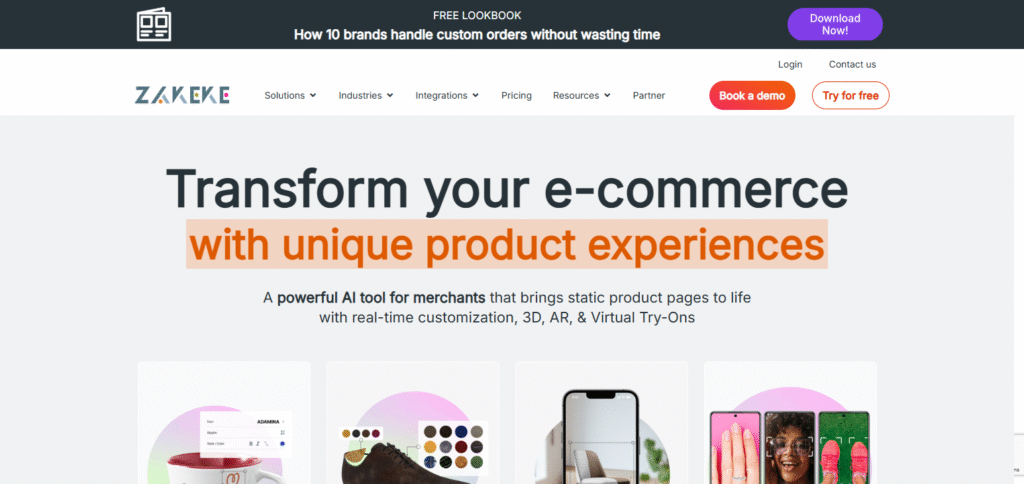
This level of interactivity helps customers feel more satisfied and engaged while shopping and less anxious about the decisions they are making.
Retailers are empowered by Zakeke to deliver a tailored experience powered by technology without requiring advanced technical knowledge or bespoke solutions.
| Category | Details |
|---|---|
| Platform | Zakeke |
| Technology Type | Augmented Reality (AR) for eCommerce |
| KYC Consideration | No KYC required for merchants or customers |
| Primary Use Case | Enhancing product visualization and customization |
| Key Features | 3D product previews, AR try-on, interactive customization |
| Supported Devices | Mobile, desktop, AR-enabled browsers |
| Retail Benefits | Boosts customer engagement, reduces returns, increases conversions |
| Integration | Compatible with Shopify, WooCommerce, Magento, and other platforms |
| Notable Brands Using It | Nike, IKEA, fashion and furniture retailers |
| Market Impact | Helps businesses improve customer experience and sales |
3.Google ARCore
AR Google is one of the leading technologies in the retail sector. This is because of its understanding of the environment and support for many android devices.
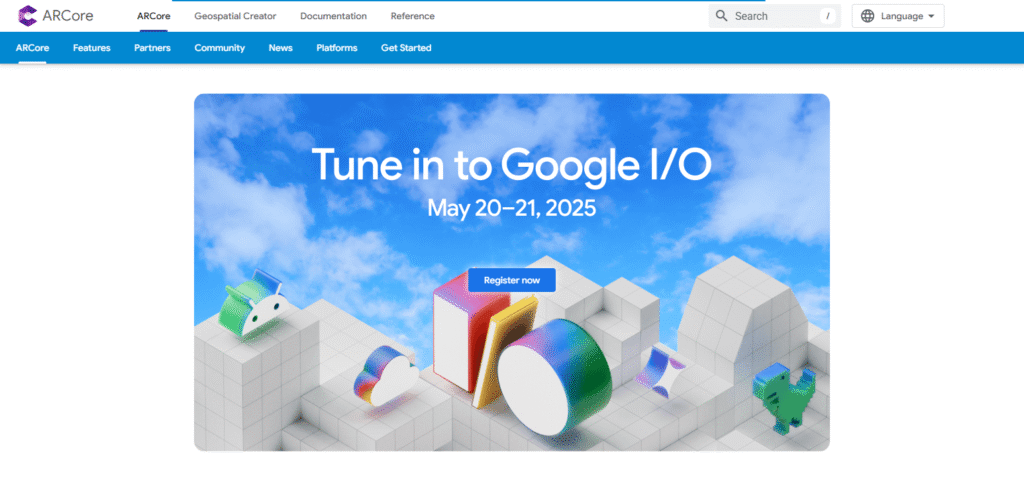
Its specific strength is the ability of surface detection and lighting estimation, which is done together with numerous android devices running AR Google. This allows sellers to showcase merchandise in their clients’ venues.
Such features enable realistic shopping experience through mobile applications, where customers can virtually touch the products before they purchase them. Retailers now have an incredibly easy approach to enhance digital shopping journeys thanks to integrated android powered tools from AR Core.
| Category | Details |
|---|---|
| Platform | Google ARCore |
| Technology Type | Augmented Reality (AR) for mobile and retail |
| KYC Consideration | No KYC required for merchants or customers |
| Primary Use Case | Enhancing product visualization and interactive experiences |
| Key Features | Motion tracking, environmental understanding, light estimation |
| Supported Devices | Android and iOS devices with ARCore support here |
| Retail Benefits | Enables immersive shopping, improves customer engagement |
| Integration | Works with eCommerce platforms and custom apps |
| Notable Brands Using It | Wayfair, IKEA, fashion and furniture retailers |
| Market Impact | Helps businesses create interactive AR experiences for customers |
4.Apple ARKit
ARKit by Apple is one of the most valuable retail augmented reality systems with accurate placement of objects and interaction on iOS devices. Its core strength stems from fusing machine learning with LiDAR depth sensing to ultra-realistically preview products in real time.
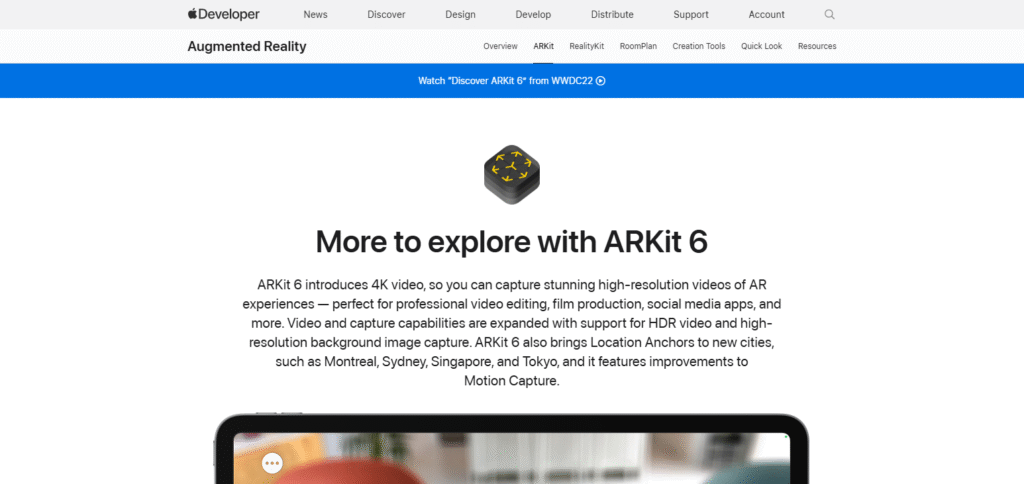
This spatial correctness builds buyer confidence and improves their shopping experience. The effortless implementation within Apple’s ecosystem enables retailers to develop sophisticated and responsive AR experiences for iPhone and iPad users, trusting that ARKit will deliver responsiveness in every interaction.
| Category | Details |
|---|---|
| Platform | Apple ARKit |
| Technology Type | Augmented Reality (AR) for iOS devices |
| KYC Consideration | No KYC required for merchants or customers |
| Primary Use Case | Enhancing product visualization and interactive shopping |
| Key Features | Motion tracking, scene understanding, object placement |
| Supported Devices | iPhones and iPads with ARKit support here |
| Retail Benefits | Enables immersive shopping, improves customer engagement |
| Integration | Works with eCommerce platforms and custom apps |
| Notable Brands Using It | IKEA, Wayfair, fashion and furniture retailers here |
| Market Impact | Helps businesses create interactive AR experiences for customers |
5.Vuforia (by PTC)
Vuforia, offered by PTC, is one of the leading augmented reality (AR) solutions for retail due to its advanced image and object recognition features.
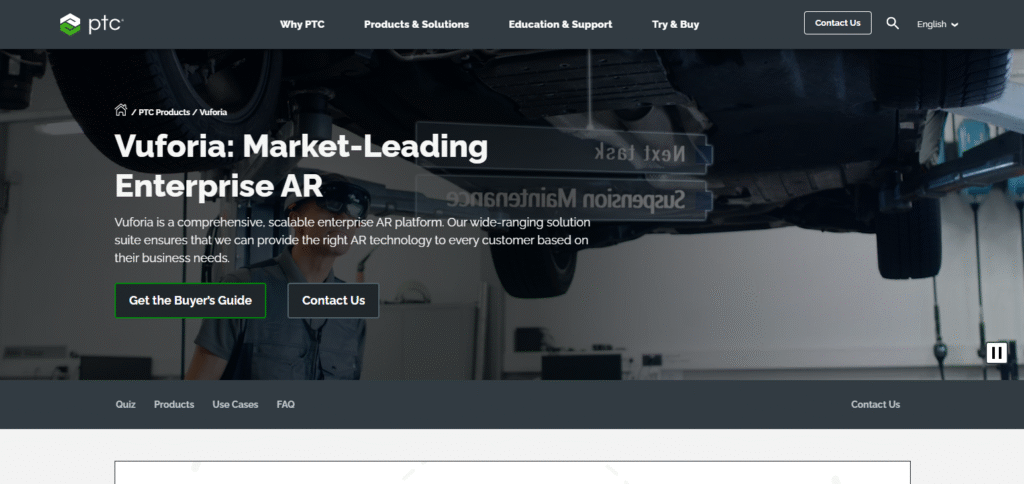
It enables augmented reality experiences that properly align with the physical items or packaging interfaces, changing simple displays into interactive experiences.
This change enhances customer engagement as digital images now relate to physical items. Retailers looking to creatively and efficiently integrate real and digital shopping experiences will find Vuforia useful because of its cross platform versatility, strong tracking capabilities, and wide-ranging applicability.
| Category | Details |
|---|---|
| Platform | Vuforia by PTC |
| Technology Type | Augmented Reality (AR) for enterprise and retail |
| KYC Consideration | No KYC required for merchants or customers |
| Primary Use Case | Enhancing product visualization and interactive experiences |
| Key Features | 3D object tracking, AR overlays, real-time visualization |
| Supported Devices | Mobile, tablets, AR-enabled browsers, smart glasses |
| Retail Benefits | Improves customer engagement, enhances product interaction |
| Integration | Works with eCommerce platforms and enterprise applications |
| Notable Brands Using It | Industrial and retail brands leveraging AR for training and visualization |
| Market Impact | Helps businesses create immersive AR experiences for customers |
6.MagicMirror
MagicMirror redefines retail AR technology by enabling mirrors in stores to become interactive displays.
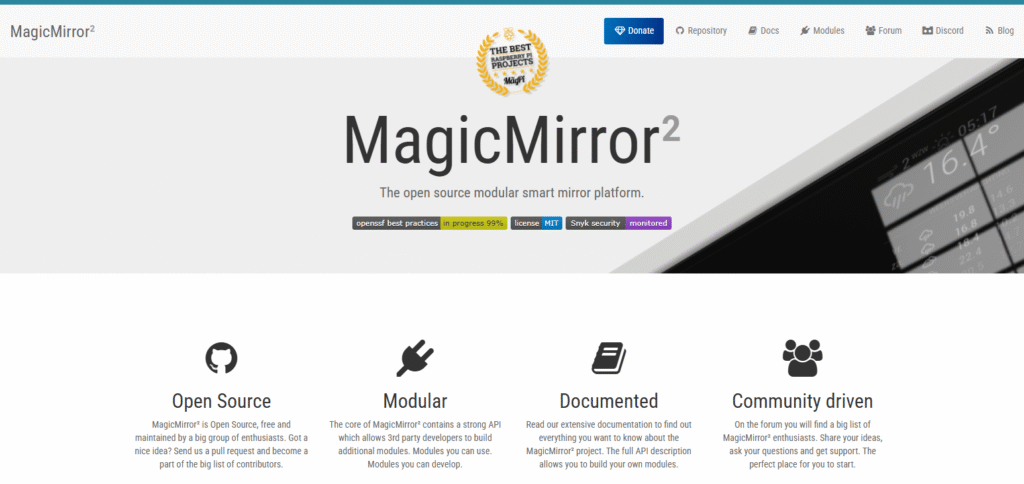
It stands out because it allows customers to virtually try on different clothing, accessories, or cosmetics at the point of sale without physically trying them on. Wielding so many advantages over traditional methods, MagicMirror enhances the shopper experience and transforms retail environments.
It goes beyond simply bridging physical retail locations and online technology, integrating digital engagement and interactivity into a seamless experience.
| Category | Details |
|---|---|
| Platform | MagicMirror |
| Technology Type | Augmented Reality (AR) for interactive retail |
| KYC Consideration | No KYC required for merchants or customers |
| Primary Use Case | Virtual dressing rooms, AI-enhanced branding experiences |
| Key Features | 4K display, touchscreen, AI detection, gesture-based interaction |
| Supported Devices | Interactive kiosks, smart mirrors, AR-enabled displays |
| Retail Benefits | Enhances customer engagement, reduces returns, improves shopping experience |
| Integration | Works with retail stores, event agencies, and museums |
| Notable Brands Using It | Fashion retailers, beauty brands, interactive shopping spaces |
| Market Impact | Helps businesses create immersive AR experiences for customers |
7.Banuba Face AR
Banuba Face AR is an exceptional example of an augmented reality (AR) application in the retail sector, being particularly useful in beauty and fashion.
Its face tracking and filter rendering are so high-tech that customers can virtually try on makeup, eyewear, or other accessories with pinpoint accuracy.
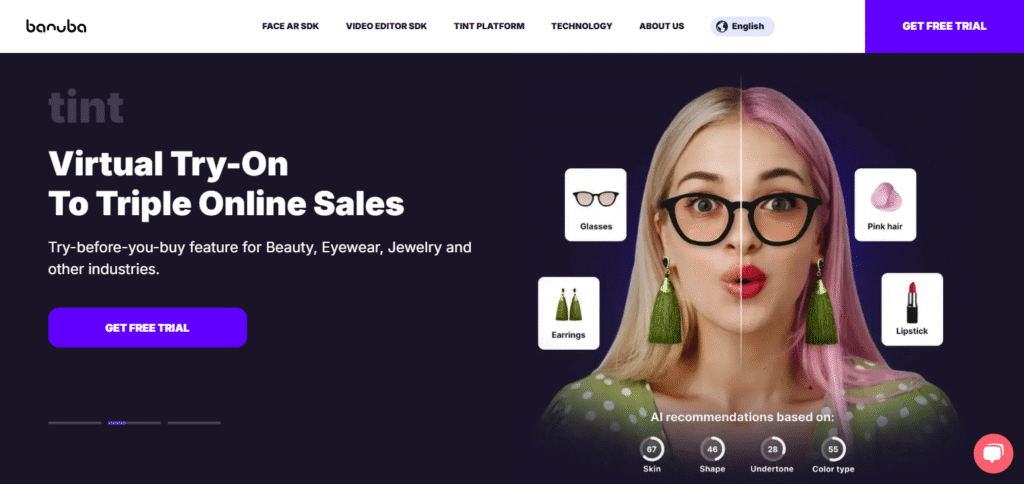
This technology improves customization by minimizing the tangible trials that a customer has to undergo, thus promoting cleanliness and ease of shopping.
Banuba enables retailers to capture the attention of the customers with interactive interfaces and increases customer trust in the products, thereby boosting sales in both online and physical stores.
| Category | Details |
|---|---|
| Platform | Banuba Face AR SDK |
| Technology Type | Augmented Reality (AR) for retail and eCommerce |
| KYC Consideration | No KYC required for merchants or customers |
| Primary Use Case | Virtual try-ons, face filters, interactive shopping |
| Key Features | AI-powered facial recognition, gesture tracking, virtual makeup |
| Supported Devices | Mobile, desktop, AR-enabled browsers |
| Retail Benefits | Enhances customer engagement, reduces returns, improves personalization |
| Integration | Works with eCommerce platforms, beauty brands, and fashion retailers |
| Notable Brands Using It | Makeup and fashion brands leveraging AR for customer interaction |
| Market Impact | Helps businesses create immersive AR shopping experiences |
8.Wanna SDK
Wanna SDK is an unmatched retail-focused AR tech SDK for fashion and footwear brands. Its most remarkable characteristic is the virtual try-on for shoes and apparel which is hands-free and utilizes a smartphone camera, ensuring the most realistic appearance and fit.
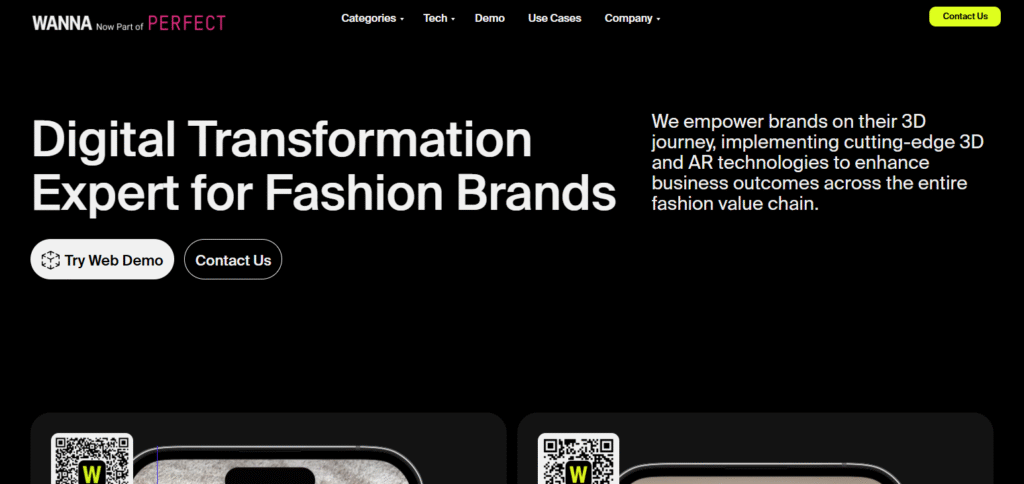
This allows customers to confidently make purchase decisions without physically interacting with the product. Enhanced customer engagement and dwindled return rates both aid Wanna SDK retailers as competitors in digital shopping, style, innovation, and convenience all blended into one effortless AR experience.
| Feature | Details |
|---|---|
| Target Industry | Fashion and footwear retail |
| Key Functionality | Virtual try-on for shoes and apparel using smartphone cameras |
| Unique Selling Point | High-fidelity AR rendering for a realistic shopping experience |
| KYC Requirements | Minimal, as the focus is on AR functionality and not personal data collection |
| Platform Compatibility | Works across mobile devices (iOS and Android) |
| Benefits for Retailers | Reduces return rates, enhances customer confidence, and boosts engagement |
| Customer Experience | Convenient and interactive shopping experience with no physical trials |
| Integration | Easy integration with existing retail apps and eCommerce platforms |
9.Snap AR (Lens Studio)
Snap Lens AR (Lens Studio) is one of the best frameworks for implementing AR in retail as it gives the brands tools to maximize audience engagement through Snapchat.
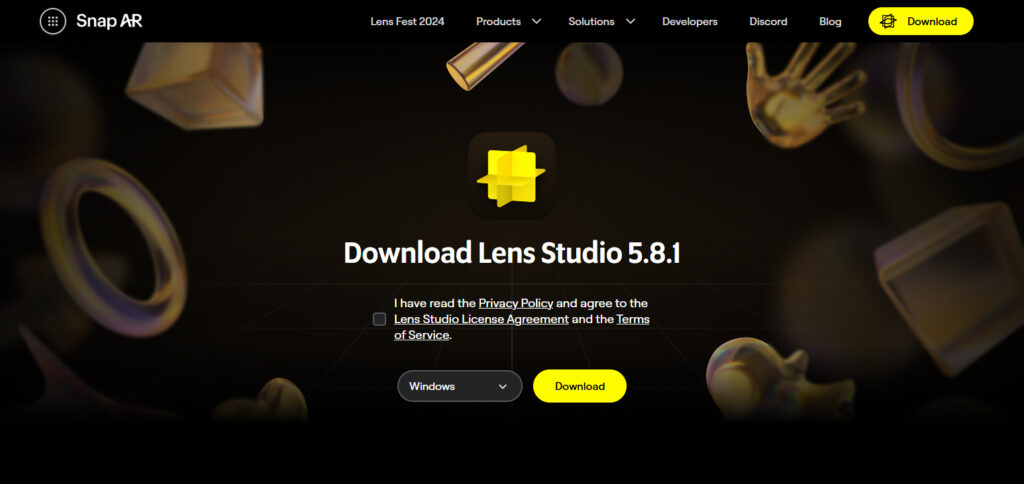
Its key differentiator is the social aspect – marketers can create interactive lenses through which users can apply products such as glasses or makeup and share them on social media.
The ability to blur marketing with social media is what makes users endorsers to brands by improving brand exposure and interaction, thus making it perfect for retail-oriented social campaigns.
| Category | Details |
|---|---|
| Platform | Snap AR (Lens Studio) |
| Technology Type | Augmented Reality (AR) for retail and eCommerce |
| KYC Consideration | No KYC required for merchants or customers |
| Primary Use Case | Interactive shopping experiences, branded AR filters |
| Key Features | AI-powered AR effects, virtual try-ons, real-time engagement |
| Supported Devices | Mobile (Snapchat), desktop, AR-enabled browsers |
| Retail Benefits | Enhances customer engagement, boosts conversions |
| Integration | Works with Snapchat, eCommerce platforms, and custom apps |
| Notable Brands Using It | Fashion, beauty, and retail brands leveraging AR for marketing |
| Market Impact | Helps businesses create immersive AR shopping experiences |
10.8thWall (by Niantic)
8thWall (by Niantic) is known for being one of the top developers in augmented reality (AR) technology for retail.
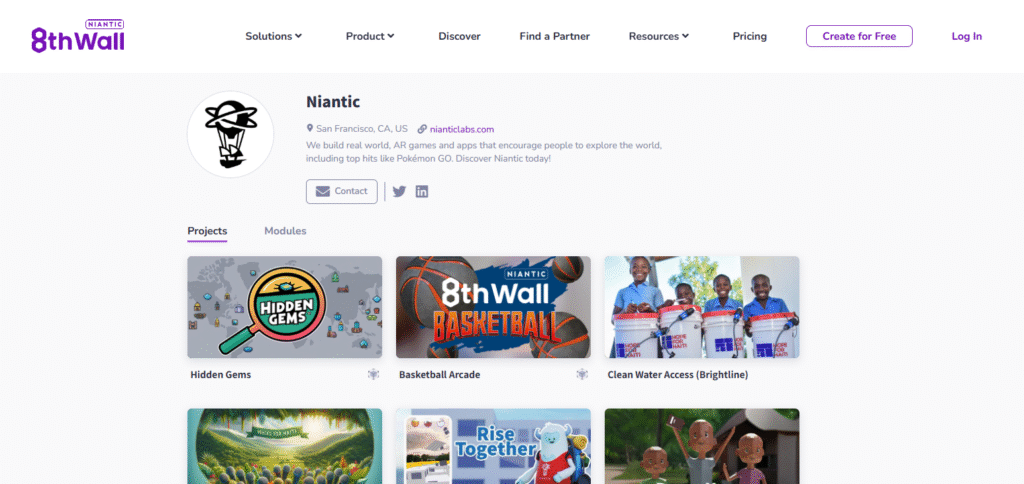
This is because of its web-based AR experiences that do not require any application downloads. Via iOS, Android, and the web, retailors are efficiently reached because of 8thWall’s cross-platform capabilities which serves as a competitive advantage.
Transforming eCommerce platforms, 8thWall integrates immersive product trials which enhance the user experience and improve engagement, conversion rates, and overall customer satisfaction.
| Category | Details |
|---|---|
| Platform | 8th Wall by Niantic |
| Technology Type | Web-based Augmented Reality (WebAR) |
| KYC Consideration | No KYC required for merchants or customers |
| Primary Use Case | Retail AR experiences, interactive product visualization |
| Key Features | WebAR deployment, real-time 3D rendering, no app required |
| Supported Devices | Mobile, desktop, AR-enabled browsers |
| Retail Benefits | Enhances customer engagement, improves conversions |
| Integration | Works with eCommerce platforms and brand activations |
| Notable Brands Using It | Pepsi, Nike, Porsche, Netflix, Heineken, LEGO |
| Market Impact | Expands AR accessibility with browser-based solutions |
Conclusion
To summarize, the best augmented reality (AR) technologies for retail including Shopify AR, Zakeke, Google ARCore, and Apple ARKit, Vuforia, MagicMirror, Banuba Face AR, Snap AR, 8th Wall and Wanna SDK each possess distinctive features that improve the shopping experience.
From extending product visualization and virtual try-ons to interactive displays inside stores, AR provides retailers with new avenues for customer engagement which is proven to increase conversions, decrease returns, and reshape the shopping experience by merging the physical and digital realms.

